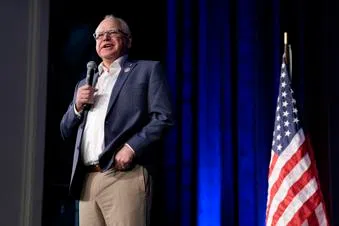
Minnesota Gov. Tim Walz speaks at a town hall event at Roosevelt High School, Friday, March 14, 2025, in Des Moines, Iowa. (AP Photo/Matthew Putney)
By: Madison McVan
ST. PAUL, Minn. (Minnesota Reformer) – U.S. Rep. Ilhan Omar gave a succinct response to a question posed to her by a reporter from the right-wing Daily Caller a few weeks ago: “F*ck off.”
Not long ago, a politician uttering the phrase may have shocked the Minnesota electorate’s civil sensibilities. But Omar was evidently satisfied with the interaction — she later tweeted it out — and in a matter of days, if not hours, even conservative posters had moved on.
It took awhile to reach the Upper Midwest, but Democrats here have joined a national trend, employing the kind of crass language that Donald Trump ushered into the political discourse almost a decade ago.
Back in October, less than a month before he and Democratic presidential candidate Kamala Harris would lose the general election, Gov. Tim Walz revved up a friendly audience in Madison.
“Elon’s on that stage, jumping around, skipping like a dipsh*t on these things,” Walz said, pausing for the audience’s laughter. He added: “You know it!”
The moment went viral, and Walz has since repeated the bit, sparking comparisons to Trump’s affinity for name-calling (though “Trump’s remarks were typically directed toward elected officials of color, not white billionaires,” The New York Times noted, helpfully).
Minnesota Democratic politicians are usually relatively mild in their cussing, but one thing seems clear: They’re cursing more freely, and often with gusto.
Since the start of Walz’s vice presidential run, he could frequently be heard bemoaning this or that “damn” thing — “Mind your own damn business” — like a dad suffering over his lawnmower engine, or a frustrated high school football coach.
In a recent town hall in Texas, he said: “How about we just be proud of our policies, take it everywhere, and we will win the damn election on that.”
But he’ll occasionally rip off a more weighty curse word. In a recently published interview with The Atlantic’s Mark Leibovich, Walz said he regretted that neither he nor Harris went on the Joe Rogan podcast during the campaign.
“I’m like, ‘f*ck it,’” Walz said. “Just go.”
Nearly 10 years ago, Trump transformed the way politicians talk, and especially the way they curse: openly and without apology. He won the 2016 election immediately after the publication of a tape in which he infamously described grabbing women’s genitals and has freely used curse words and vulgar language ever since.
Prior to Trump, cursing was scandalous for politicians. Former President Barack Obama once referred to his opponent Mitt Romney as a “bullsh*tter,” grabbing headlines and sparking Republican outrage.
So why are Minnesota Democrats suddenly cursing so much?
Politicians swear in part to seem — irony alert — more authentic, said Melissa Mohr, swearing expert and author of “Holy Sh*t: A Brief History of Swearing.”
“A lot of what politicians do in their speeches is quite scripted, and swearing is a way to use language to make it feel like you’re saying things from your heart,” Mohr said.
For Democrats facing the deluge of Trump’s executive actions in the first months of his second term — funding cuts to agencies, mass layoffs, the transfer of immigrants to an El Salvador prison, his defiance of the courts and more — cursing is also a way to emphasize the seriousness of the moment.
“Usually when we swear, that’s because we’ve got some deep emotion about something, whether it’s pain or frustration or joy,” Mohr said.
But cursing can also backfire when it’s not convincing, Mohr said.
If voters pick up on a slight hesitation before a bad word, a strange emphasis, or the unusual construction of a phrase, it could signal that the cursing is more of a strategic choice by speechwriters than a genuine burst of emotion from the speaker.
“When it’s not authentic, it comes off as extra not-authentic, and I think that that definitely turns people away,” said Republican lobbyist and local stand-up comedian Brian McDaniel.
As the parties have become more polarized and less inclined to appeal to centrist voters, Republicans — with the notable exception of the commander in chief — have kept their speeches clean so as not to offend the religious base of the party, McDaniel said, whereas Democrats’ cursing can be taken as a way to “stick it to the man.”
Democrats here may have taken a bit longer to jump on the cussing trend because they’re entrenched in the culture of “Minnesota nice.”
Minnesotans and their politicians seem to have a more reserved approach to swearing than people from other regions, though it’s difficult to accurately measure how frequently a population curses. A 2015 map of swear-word frequency compiled by a linguist and based on tweets, seems to indicate that Minnesotans generally swear less, at least in the online public sphere, than people from other areas.
Although lately with the Dems, it’s hard to tell.
On X, DFL Sen. Tina Smith captioned a post by Elon Musk, who was instructing federal employees to send a summary of their accomplishments for the week: “This is the ultimate d*ck boss move from Musk — except he isn’t even the boss, he’s just a d*ck,” Smith wrote.
And when Smith announced she wouldn’t be seeking re-election, state Senate Majority Leader Erin Murphy’s official statement began with a two-word sentence: “Well shit.” (Murphy later showed more restraint: “My mouth is full of cuss words right now,” she said regarding recent negotiations with Republicans on the final day of the legislative session.)
It’s not just a Minnesota thing: U.S. Sen. Elise Slotkin got fiery and profane recently while urging Democrats to “f*cking retake the flag” and to adopt “the goddamn Alpha energy.”
In the case of both Slotkin and Walz, the cussing shows emotion and seeks to shape Democratic identity, melding it to the working class party of old.
In this populist moment, Mohr said, swearing codes populist.
“When you break that mold and you swear,” Mohr said, “it kind of brings you to that ‘ordinary’ person’s level.”




Comments